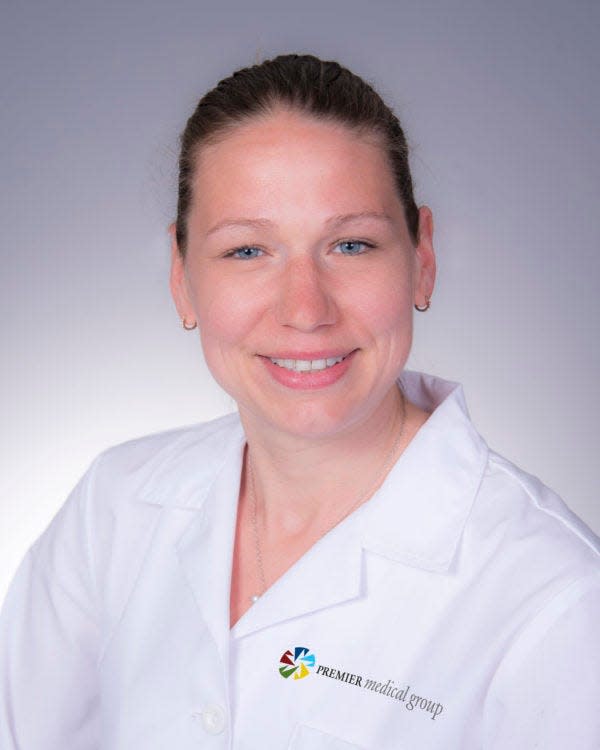New Year's resolution to get healthier? 6 ways to ensure you succeed
The start of a new year prompts many people to reflect on their health and well-being, as well as redefine their habits.
If your resolution is to get healthier this year, a few simple techniques can help start your journey off strong.
Below you'll find six areas of wellness to target your efforts, broken down in detail with additional tips from health and nutrition experts in the Hudson Valley.
Doing physical activity or exercise that you love
"The key really is to find something that you like; that you're going to look forward to doing," said Dr. Reed Idriss, medical director of Nuvance Health-GoHealth Urgent Care. "Just be honest with yourself about what kind of exercise and movement you enjoy." This could include anything from gardening, hiking and being outside, to using a Peloton or treadmill at the gym.
Doing these activities or exercises with someone you like spending time with is even better. They can hold you accountable, Idriss said, on those inevitable days when you don't feel like you have the energy to keep active.
Make physical activity and exercise a habit, "almost becoming second nature," he said, but don't be too strict with the plan. If you wake up in the morning and decide you would rather take a walk than do yoga, go for it. What's vital is doing some type of movement you enjoy, so it becomes a part of your routine.
It's important to start slow with modest goals that are attainable to avoid strains, injuries and heart health issues. "If you haven't really been exercising regularly, you want to let your body get into it and accustomed to the exercise," he said.
More: With winter storm aimed at Northeast this weekend, here's what to expect in Hudson Valley
Building healthy social connections

Patricia Wilkins-Vacca, LCSW-R, is a clinical social worker and therapist in Poughkeepsie. Setting up healthy social connections can look like many different things, she said in an email response to questions, such as joining a group who have similar interests, signing up for a class with someone for fun or exploring new interests. If you're looking to join a group, she suggests trying a running club, yoga, book club, art group or a gym.
"Connection can give a sense of belonging, togetherness, combat loneliness," she said. "We can feel a sense of support and that we’re not alone, as well as a sense of feeling cared for and valued."
These connections can reduce stress, help develop trust and improve self-esteem. Respecting boundaries also plays a role. "Realize who you may not feel comfortable to be around, and it’s okay to decide not to spend time with those people. "
More: East Fishkill Officer Daniel DiDato was 'one of a kind'. Colleagues share tributes.
Adding whole foods, avoiding 'fad diets'

Theresa Zangerle-McArtin is a registered dietitian and nutritionist at Premier Medical Group's Poughkeepsie and Fishkill locations. She said the first thing she always tells patients is "fad diets" aren't the answer.
Instead, she encourages looking at sustainability and whole foods.
"It's about knowing what's going to work for you, and that five years from now we can still see ourselves doing that," she said. "Give yourself realistic expectations."
The food you eat, Idriss added, should look like a rainbow on your plate, including whole grains, fruits, vegetables, legumes, nuts and seeds to keep your body working and feeling its best.
Zangerle-McArtin also said it's OK to indulge every so often, especially in social settings where food is present, and it's better to do so than let those cravings fester. "We end up thinking about it more and more... then we wind up usually eating a lot more than if we just had that one piece of pie or cake," she said.
Avoiding drugs, alcohol
Wilkins-Vacca highlighted the risks associated with drug and alcohol abuse include addiction, deteriorating health and legal consequences, and could in some cases stretch to financial difficulties or family conflict.
Know whether there's a family history of drugs or alcohol use, learn coping strategies, and get evaluated or treatment if needed, she suggested.
"Adults should take inventory of how much and how often they are drinking or using another substance, or if a loved one expresses concern about their usage," she said.
Ensuring you're getting the proper amount of rest
"The goal should be getting at least seven hours of sleep at night," Idriss said. "You'll notice tremendous differences in how you feel psychologically and physically."
Staying consistent and creating a routine for yourself, Idriss noted, is best practice. It might not be realistic for everyone, depending on work schedules and family life, "but that would be ideal," he said.
To promote restorative sleep, Idriss recommended not drinking alcohol as you're getting ready to go to bed, limiting your screen time, avoiding having a TV in your bedroom, having your room as dark as possible when you go to bed and as light as possible when you want to wake up.
Along with this, Wilkins-Vacca added your physical and mental health may be affected by lack of proper rest. Increased irritability, increased anxiety or depression, brain fog, lack of focus, inability to finish projects at work or home and an increased risk of developing or worsening health conditions can all come from not getting enough sleep, she wrote.
Saying 'no' to stress
When it comes to dealing with stress, Wilkins-Vacca wrote, "Try not to take on more than you feel you can handle; it’s okay not to keep up with everyone else."
If you're looking for tips to prevent stress, Wilkins-Vacca noted techniques such as budgeting realistically, taking time for yourself and to care for yourself, limiting alcohol consumption and sweets, engaging in acts of kindness, and getting outside for a walk, even if it's only for 10 minutes a day during the winter. She also recommends trying a meditation app.
Along with this, it's OK to say "No," which may be difficult for some to take on, but is vital.
"Most of all, if you need help, ask for help; seek professional help if needed," she wrote.
Each of these areas is interconnected
Each of these lifestyle changes is equally significant. They are more like essential spokes that work together to support a wheel, Idriss said.
Wilkins-Vacca added, "I often talk to clients about looking at their whole wheel, and what’s on that wheel, and is that wheel balanced?"
Each area of wellness is intertwined with one another, and with one leading to the next as interconnected strategies to be the healthiest, happiest and most successful versions of ourselves, Idriss said.
Wilkins-Vacca mentioned it's also important to look at an individual's strengths, rather than focusing on their flaws. Picking out what part of the wheel is holding up as much as the rest is usually not too hard for people to determine, she explained, so it's important to also take into account all we are doing well.
Looking at yourself as a whole and everything going on around you will help determine the best course of action to be the healthiest you, Zangerle-McArtin added. These areas of wellness are all habitual and lifestyle alterations, and "it's a change for life," she said.
Idriss noted those who grow in these areas can also decrease their risk for chronic illnesses including heart disease, diabetes, high blood pressure, cancer, stroke and dementia.
Nickie Hayes: NHayes@poughkee.gannett.com: 845-863-3518
This article originally appeared on Poughkeepsie Journal: New Year's resolution: 6 tips Hudson Valley experts stand by
